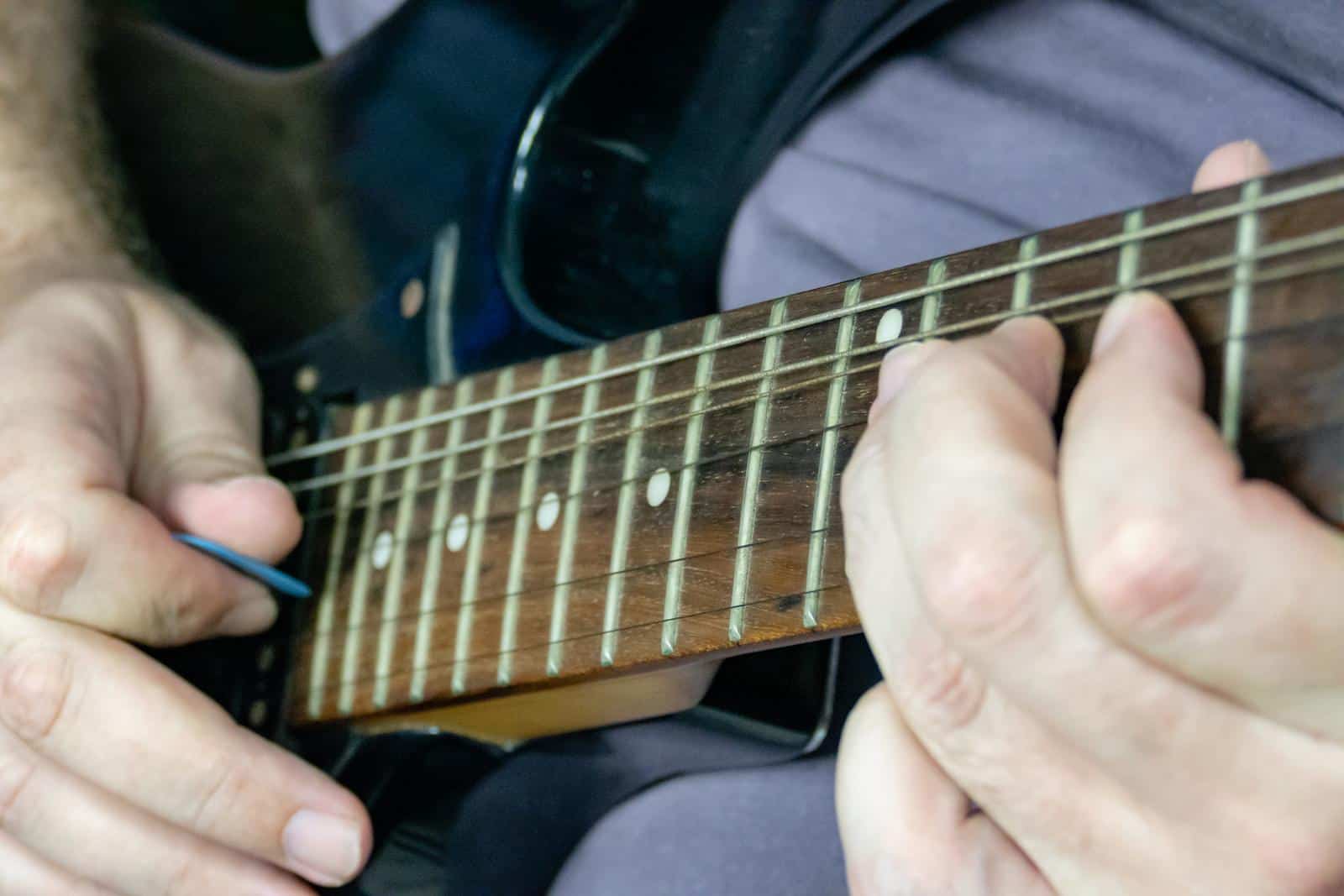For over 30 years, I’ve had the privilege of witnessing countless students embark on their guitar journeys. From wide-eyed beginners staring at their first instrument with a mix of wonder and excitement to budding shredders eager to conquer complex solos, the questions they ask remain remarkably similar.
So, let’s address your burning questions and equip you with some pro tips to get you started on the right foot!
Dispelling the Myths: The “Fastest Way” to Guitar Greatness
Let’s face it, we’ve all seen those online ads promising to turn you into a guitar hero in a weekend. While these claims might be tempting, here’s the truth… there’s no magic bullet. Consistent practice is the cornerstone of progress.
Think of it like building a magnificent castle – you wouldn’t rush the foundation, would you? The same goes for guitar. Mastering the fundamentals – proper posture, finger placement, and basic chords – takes time and dedication. But the good news is, with consistent effort, you’ll be surprised at what you can achieve in a relatively short timeframe.
Here are some additional pointers to keep in mind:
Focus on Quality Over Quantity:
It’s better to practice for 15 minutes with focused attention than to mindlessly strum for an hour. Dedicate your practice sessions to specific goals, like mastering a new chord transition or improving your strumming technique.
Break down complex skills into smaller, manageable chunks. For example, instead of trying to learn an entire song at once, focus on mastering individual sections first. This targeted approach allows you to focus on detail and build muscle memory more effectively.
Imagine yourself diligently practising the transition between G major and D major chords for 10 minutes. Pay close attention to the finger placement and ensure a clean transition without any unwanted string noise.
Set Realistic Expectations: Don’t get discouraged if you don’t sound like your favourite guitarist after a week. Learning guitar takes time, and everyone progresses at their own pace. Celebrate your small victories – mastering a new chord shape or learning a simple song feels fantastic!
These milestones fuel your motivation and keep you engaged on your musical journey. Track your progress by recording yourself periodically. Listen back to your recordings and identify areas for improvement. You’ll be surprised at how much you’ve progressed over time.
Imagine yourself recording a simple blues progression on your phone at the beginning of your journey. A few weeks later, record yourself playing the same progression again. You’ll likely hear a noticeable improvement in your clarity, timing, and overall sound.
Find Inspiration:
Surround yourself with music that motivates you. Watch live performances of your favourite guitarists, listen to instrumental pieces that showcase different techniques, and attend concerts if possible. Immerse yourself in the world of guitar music.
Let the passion and skill of others inspire you to keep practising and reaching for your own goals. Create a dedicated playlist of songs you love to play or aspire to play. Having a source of inspiration readily available can make a big difference in your motivation.
Maybe it’s the soulful blues licks of B.B. King, the heart-pounding rhythm of Angus Young, or the intricate fingerpicking patterns of Andy McKee. Whatever your taste, find music that ignites your passion for the guitar.
Embracing Technology: Guitar Lesson Apps for the Modern Learner
The world of guitar instruction has undergone a revolution with the rise of guitar lesson apps. These apps offer a fantastic, interactive way to learn, particularly for those who prefer a more self-directed approach. Imagine having a pocket-sized guitar teacher readily available! Here’s a closer look at the benefits of using guitar lesson apps:
Structured Learning:
Most apps provide a well-structured curriculum, guiding you through the fundamentals step-by-step. You’ll learn proper posture, finger placement, basic chords, strumming patterns, and even some music theory concepts. Many apps also cater to different learning styles, offering video demonstrations, interactive exercises, and written explanations.
Imagine a beginner-friendly app that starts you off with a video lesson on proper posture. The instructor explains how to sit or stand comfortably, how to hold the guitar against your body, and how to position your fretting and picking hands for optimal playing.
Interactive and Engaging:
Learning guitar shouldn’t feel like a chore. Apps often utilize video demonstrations, interactive exercises, and gamification elements to keep your learning experience fun and engaging. Imagine earning points for completing exercises or unlocking new lessons as you progress.
This playful approach can make learning feel less like work and more like a game. Maybe the app presents a fingerpicking exercise where you earn points for each note played accurately. Or perhaps you complete a strumming challenge where you must match the rhythm displayed on the screen.
The Time Enigma: Unveiling the “How Long” of Learning Guitar
Ah, the age-old question that plagues every aspiring guitarist – how long will it take me to learn guitar? The truth is there’s no one-size-fits-all answer. It depends on a multitude of factors, like your prior musical experience, practice habits, learning style, and musical goals.
However, fear not! We can shed some light on this time enigma and provide a roadmap to gauge your progress.
The Dedication Factor: Practice Makes Progress (But Not Just Any Practice)
To reiterate one of the first things mentioned in this article, imagine building a majestic sandcastle – you wouldn’t expect a towering masterpiece overnight, would you? The same principle applies to the guitar.
Consistent, focused practice is the key to progress. Dedicating short bursts of focused practice (think 15-30 minutes) consistently throughout the week will yield far better results than sporadic marathon sessions.
Here’s a breakdown of what you can expect based on your practice commitment:
Casual Player (15-30 minutes a few times a week):
With this level of practice, you can expect to grasp basic chords, and strumming patterns, and be able to play along with very simple songs within a few months. Think campfire classics or stripped-down versions of popular tunes.
While you won’t be shredding solos anytime soon, you’ll be able to enjoy playing basic music and have a foundation to build upon.

Dedicated Student (30-60 minutes most days of the week):
This level of dedication shows serious commitment! Within 6-12 months, you’ll likely be comfortable with a wider range of chords, be able to play barre chords (a technique that unlocks many possibilities), and tackle more complex strumming patterns.
Power chords for rock music or fingerpicking patterns for folk songs might also be within your grasp. You’ll be able to play a decent repertoire of songs and impress your friends and family.
Guitar Enthusiast (1+ hour of daily practice):
If you dedicate an entire hour or more to daily practice, expect rapid progress! Within a year or two, you’ll be comfortable with a vast array of chords and techniques. Barre chords will become second nature, and you’ll be exploring advanced concepts like scales, music theory, and improvisation.
Soloing, complex fingerpicking patterns, and even attempting intricate pieces by your favourite guitarists become achievable goals.
Beyond Practice: Other Factors that Influence Your Timeline
While practice is king, here are some other factors that influence your learning speed:
Prior Musical Experience:
Having a musical background, even on another instrument, gives you a head start in understanding rhythm, notation, and musical concepts. This can accelerate your learning curve.
Learning Style:
Some people learn best visually through video lessons, while others prefer hands-on learning with a teacher. Identifying your learning style and finding resources that resonate with you will optimize your progress.
Musical Goals:
Are you aiming to play campfire classics, shred like a rock god, or master fingerpicking blues? Different goals require different skill sets and timelines. Setting realistic goals keeps you motivated and focused.
Remember, the Journey is the Reward
Focus on the enjoyment of the process, and before you know it, you’ll be surprised at how far you’ve come. After all, the time it takes to learn guitar is truly a personal journey, and the most important thing is that you’re having fun and expressing yourself through music!
While the path to guitar mastery may seem long and winding, remember, every professional guitarist you admire started exactly where you are – with a burning desire to learn and a willingness to put in the work. The journey may take months or even years, depending on your dedication and goals.
But with consistent practice, the right approach, and a sprinkle of inspiration, you’ll be amazed at how quickly you progress. Celebrate your small victories, embrace the challenges, and most importantly, enjoy the process of creating music!
The time you invest will be richly rewarded by the joy of expressing yourself through this incredible instrument. So, grab your guitar, embrace the adventure, and remember – with dedication and passion, you can achieve whatever you set your mind to!
If you’re interested in learning how to play the Piano, check out this article!
